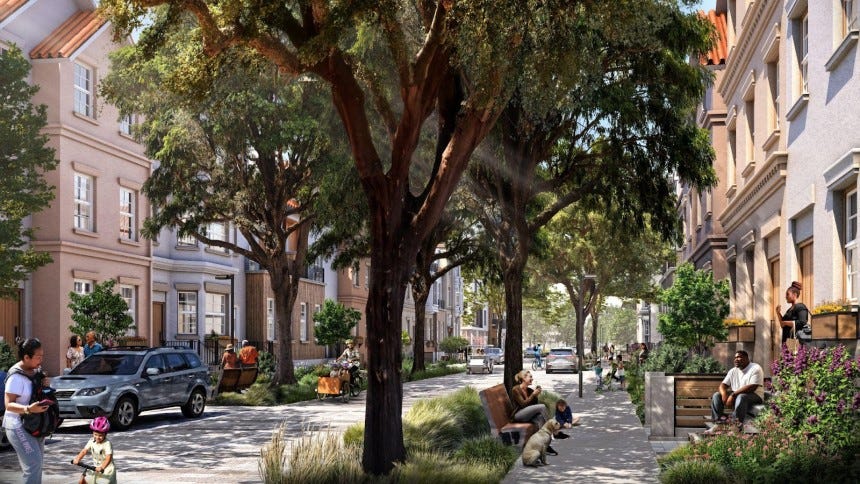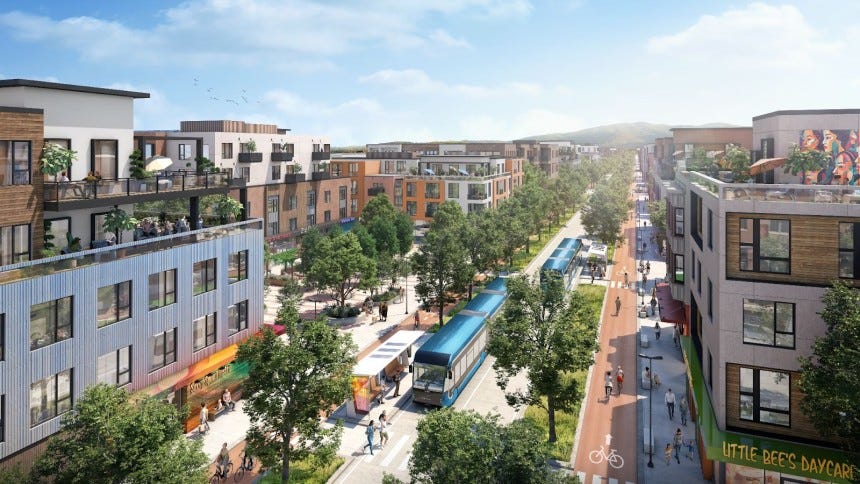🥶 Is California Forever on hold...forever?
Vol 87
This newsletter aims to separate the signal from the noise for investment in all things sustainable transportation: Electrification, mode shift, active and public transit, and mobility aggregation, across both people and goods movement.
A message from this issue’s sponsor:
ChargeScape is a joint venture between BMW, Ford, Honda and other automakers to integrate electric vehicles into the power grid. We’re a new software start-up that is currently hiring for a number of leadership roles:
We’re seeking individuals with a background in transport electrification and/or grid modernization to join our founding team. We offer a remote-first policy, competitive compensation, and unlimited PTO. Please send your interest to talent@chargescape.com
🌱STARTUP WATCH: Sustainable mobility startups (pre-seed or seed) to keep an eye on
Air EVTOL (Israel): Two-seater electric aircraft
Chargelink (California, USA): Manufacturer and operator of EV charging stations
Determinant Materials (Florida, USA): Electronic waste recycling with traceability
Papaya Dash (United Kingdom): Fleet operation management software
Parcelrun (Australia): Last mile EV delivery platform
Parthian Energy (California, USA): Electromagnetic sensors for battery diagnosis
Soff (California, USA): Software for supply chain automation
True Balancing (California, USA): Battery management software
Westwood Aerogel (California, USA): Aerogel insulation for battery applications
💰FUNDING: Capital raises from startups previously featured in Startup Watch
Bib Batteries (Vol 40) raised a Seed round from Sylvain Grande (amount undisclosed)
Metafuels (Vol 49) secured a 4.4M Swiss franc grant from the Swiss Government’s Federal Office of Energy
Blumen Systems (Vol 55) raised $6.4M in funding (investors undisclosed)
Axle Energy (Vol 57) raised a $9M Seed round led by Accel, with participation from Eka Ventures, Picus Capital, and others
tozero (Vol 65) secured a 2.5M EUR grant from the European Innovation Council
SirenOpt (Vol 80) raised a $6.6M Seed round from Voyager Ventures, Visionaries Tomorrow, Union Labs Ventures, Climate Capital, and others
Enjoying the ability to track the next climate tech startup? Share this issue with 3 folks:
📰QUICK HITS: Notable news from the last two weeks
👩🏽⚖️Government, Policies & Cities
🚕 The California Supreme Court ruled in favor of upholding Prop 22, to the relief of Uber, Lyft, and Doordash. The ruling reaffirms that gig drivers in the state are contractors, not employees.
↘️ The US DOT warned Congress that Americans are going to need to drive less to address climate change. In short, switching to EVs isn’t enough because the appetite for miles continues to grow so quickly.
🔬Markets & Research
🇹🇭 In Thailand, Chinese EV makers are rapidly overtaking Japanese carmakers. China will be an EV superpower well beyond China, starting with Southeast Asia, Latin America, and Africa.
Not a subscriber yet?
🏭 Corporates & Later Stage
🚕 Uber signed a massive 100,000-unit EV supply deal with BYD for global markets. The devil is in the details as it’s drivers, not Uber, who actually purchase the EVs from BYD.
🚲 Amazon has opened an e-cargo bike delivery hub in Berlin. That adds to more than 50 hubs operated by Amazon on the continent.
↘️ Tesla profits fell again in Q2. The company’s aging lineup is the key culprit.
⛓️💥A Tesla analyst took Elon Musk at his word on autonomy and almost crashed. Musk continues to bet the farm on autonomy, but the company’s tech isn’t ready for prime time yet.
🔋 South Korea’s Samsung has just unveiled a 600-mile range solid-state EV battery. It’s a race to see whether China’s dominance in batteries will extend to solid-state batteries or whether South Korea, Japan, the US, or Europe have a chance.
✈️ Air New Zealand has dropped its 2030 climate targets. The airline blames Boeing’ nosedive and production bottlenecks at Airbus.
🛩️ Brazil’s Embraer has unveiled the first automated takeoff software for its planes. The company touts fuel savings as a key consideration.
🐣 Startups & Early Stage
🤖 Nuro, the last-mile autonomous delivery player, just got permission to operate on some Northern California streets. A good comeback for the company after recent setbacks.
🚛 Kodiak just completed the first successful commercial driverless freight delivery in North America. Reminder that there are still massive truck driver shortages.
DEEP DIVE: Is California Forever on hold...forever?
On August 31, 2023, The New York Times broke a story about a group of investors, many of them billionaires, who had put $900 million towards to build an urban utopia from scratch in the Bay Area’s Solano County. Until then, the project had operated in secret, buying up 50,000 acres of farmland from unwitting sellers.
Once the cover was broken, California Forever went on a charm offensive. The argument was that many of our most ambitious urban goals (denser housing, climate resilience, walkability over car dependence, etc.), are beyond the capacity of modern American city governance, most notably in NIMBY-centric San Francisco. Its proponents proposed that by building a city from scratch from converted farmland and using new governance approaches, you could get the best of European quality of life with American prosperity.

One year later, progress hasn’t exactly been linear. Late last year, the company committed to putting the project on this November’s ballot for voter approval. Less than two weeks ago, the company pulled its ballot initiative, promising to complete two years of work on an environmental impact report and detailed planning before resubmitting its plan to the voters.
While California Forever claims it is “excited” for the new process, the challenges seem to be growing rather than shrinking. Just a few weeks ago, Solano County issued a fairly scathing report on the plan in the run-up to putting the plan on the ballot this fall; California Forever will spend the next two years clarifying issues from the report like water use and the economic exposure for the county. What was once a moonshot at new governance will require adherence to existing governance approaches to move forward.
So is this progress delayed or the long, slow death of an unworkable idea? The verdict is still out. But in the meantime, there are a number of other urban experiments like Trilith, Georgia that are trying to show how density creates lower-cost housing and less car dependency.
Enjoyed this issue? Share this issue with 3 folks:




